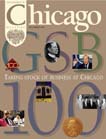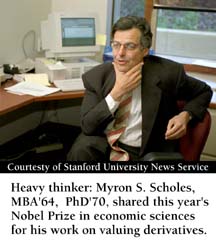
The University of Chicago Magazine
December 1997 |


Carrying on a U of C tradition, Myron S. Scholes,
MBA'64, PhD'70, took home the 1997 Nobel Memorial Prize in economic sciences
in October-making him the University's 69th Nobelist, and the 19th to win
the economics prize since it was first awarded in 1969. Scholes, who taught
in the Graduate School of Business for ten years before joining the Stanford
faculty in 1983, and who studied under 1990 Nobel laureate Mer-ton Miller,
was honored along with Harvard professor Robert C. Merton, LL.D.(Hon)'91,
for developing a method to determine the value of derivatives. Collaborator
Fischer Black, also a former U of C faculty member, died in 1995 but would
likely have shared the prize had he lived.
 Black and Scholes made their
names with the Black-Scholes formula, a method of pricing options that was
first published in 1973 in the U of C's Journal of Political Economy. Just
one month before the formula's publication, the Chicago Board Options Exchange
had opened, providing the first formal market for options trading. Black and Scholes made their
names with the Black-Scholes formula, a method of pricing options that was
first published in 1973 in the U of C's Journal of Political Economy. Just
one month before the formula's publication, the Chicago Board Options Exchange
had opened, providing the first formal market for options trading.
Options give investors the op-portunity, but
not the obligation, to buy or sell assets at a prespecified price. Until
the Black-Scholes formula, investors in share op-tions, futures, and other
derivative securities-called derivatives because their worth is affected
by, or derived from, fluctuations in the value of other assets-could not
be sure of the value of their securities. Many researchers tried to determine
the values with formulas that required assigning risk premiums. Black and
Scholes realized that a stock's price already reflected the option's risk,
and devised their famous formula accordingly.
In the past quarter century, the options market
has exploded, with the Black-Scholes formula awarded much of the credit.
In the first nine months of 1997, the Wall Street Journal reported, the
value of U.S. exchangetraded options reached $155 billion.
"Nowadays, thousands of trad-ers and investors
use the formula every day to value stock options in markets throughout the
world," wrote the Nobel committee. "Such rapid and widespread
application of a theoretical result was new to economics."
Merton, who influenced the work of the other
two and published his own article on option valuation in 1973, generalized
the formula, taking it beyond options on shares and applying it to other
derivatives. The Black-Merton-Scholes methodology has been used, for example,
to design optimal financial contracts and to determine values of insurance
contracts and guarantees.
Though best known for his work in options,
Scholes has also studied the effect of dividends on share prices and researched
the effects of global tax policies on decision making.
While an M.B.A. student at the U of C, Scholes
began working for GSB professor Merton Miller, who needed "a computer
whiz" to help with some research. Scholes worked on several more projects
with Miller, who later served as Scholes' thesis adviser, also chairing
his Ph.D. examining committee.
"I feel about Myron's award the same as
I would if it had been won by one of my children," says Miller. "This
is well-deserved."
After earning his Ph.D., Scholes joined MIT's
Sloan School of Management as an assistant professor. He returned to Chicago
in 1973, and in 1983 accepted an offer from Stanford, where he is the Frank
E. Buck professor of finance emeritus and was a senior research fellow at
the Hoover Institution.
These days, Scholes keeps busy as a principal
and partner in Long-Term Capital Management, a Greenwich, Connecticut, investment-management
firm that he helped found with Robert Merton. No doubt he'll be in great
demand as a speaker, too: In fact, Scholes is already planning a May visit
to Chicago, where he'll give the key-note address at the GSB's 1998 Management
Conference.-K.S.
Table of Contents - Top of Page
- Email
Us
|

